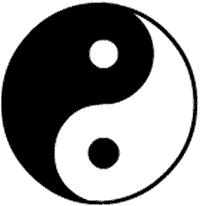
No man is an island...except perhaps the English-language critic that admits to identifying with any of Michel Houellebecq's mouthpieces.
Learned distaste appears quite universal. John Updike calls this novel
"an opinionated drone, an interminable blog from nowhere" and Michael Worton accuses Houellebecq of
"loathing both his public and mankind in general and making a festish of his own honesty."Yet I'd liken my fondness for the French reprobate's
blogs from nowehere to that of a teenage girl dating the sort of young man that unfailingly attracts parental hostility. The more they disapprove the bigger thrill she will get from their intimacy, even though in her heart of hearts, she too knows he's a bit of wrongo.
Even so, amidst all the in-yer-face loathsomeness, I have detected in Houellebecq's novels the rather adolescent urge to seek out the good self inside by vomiting up all the bad. And between the covers of this one in particular, the mood swings quite discernibly between desolation and longing.
The narrators are Daniel, a macabre comic who has prospered from the observation that
"if you attack the world with sufficient violence it ends up spitting its filthy lucre back at you" and two of his cloned
neohuman descendents, Daniels 24 and 25.
The original Daniel writes, as the author himself would have it, from the intersection of premature ejaculation and erectile dysfunction, a region of the lifecycle Houellebecq describes as the third age,
"in which the anticipation of the loss of happiness prevents you from living." Like other Houellebecq narrators he stumbles, at the apex of his disgust with the world, into love − or rather the redemptive sensation procured from realised pornographic fantasy. e.g.
"My vision clouded by sweat, having lost all clear notion of space and time, I nevertheless managed to prolong this moment a little, and her tongue had enough time to effect three complete revolutions before I came, and it was then that my whole body, irradiated by pleasure, vanished, sucked in by nothingness, in a release of blessed energy."Daniel has two women in his life, his French wife, who doesn't much like sex, and a young Spanish actress Updike labels his "
pet slut", who lacks an aptitude for love. Neither of these relationships can release him from the enveloping isolation he experiences in the contemporary world of "
definitive kids":
"With my ordinary physique and my introverted temperament I had...very little chance of being the life of the party...in the modern world you could be a swinger, bi, trans, zoo, into S&M, but it was forbidden to be old."
Houellebecq is asking many of the same questions here that he explored in
Atomised, but the conclusions appear significantly different. The neohumans of this novel are shown to have done away with the agonies of suffering and desire.
"Closing the brackets on becoming, we are from now on in unlimited, indefinite stasis." In other words, things have changed, but not exactly for the better, and Daniel25's narration includes an account of his bid to break free from the life of enclosed apathy that is the clones' apparent destiny. Might perpetual joy be the answer Daniel25 finally ponders − reminding me of a little boy I came across many years ago in Antigua who was condemned to such a mental state, and it wasn't one I would have willingly swapped my own for.
In this story Houellebecq is examining the human condition from many angles, but ultimately doesn't seem to get far with any of them. That Daniel has descendents with his own DNA is a consequence of his association with a new age sect (based on the
Raelians ) with pretentions to immortality − except that the immortality on offer here isn't the real deal, because continuity of consciousness is fudged, and each individual inner world must perish and be replaced by a copy with implanted memories. I wondered how significant it was that none of the novel's narrators (or critics) addressed this point.
It's clear that many other writers don't care for the way Houellebecq generalises from a peculiarly pessimistic perspective.
"How honest, really, is a world picture that excludes the pleasures of parenting, the comforts of communal belonging, the exercise of daily curiosity, and the widely met moral responsibility to make the best of each stage of life, including the last," Updike asks.
Yet is Houellebecq's middle-aged misanthrope Daniel really so much more freakish than
Ian McEwan's Henry Perowne, with his virtually flawless professional, family and married sex life?
I don't think you have to be, like me, mildly sociopathic, in order to grasp the troubling truths lurking within the calculated exaggerations Houellebecq calls honesty. In that sense reading his fiction is much like reading
Jean Baudrillard, and in as much that other acerbic Frenchman is a theorist that often chooses to adopt a literary, 'performance' style of exposition, Houllebecq is a novelist whose fictional narratives are usually poorly disguised polemics. But to say that they violate the accepted form of the modern novel is to make a rather empty point I think.
One of my forthcoming literary write-ups will be of a book with an altogether more
humane perspective − José Saramago's
Seeing − yet nonetheless one whose long, embedded sentences are currently reminding me of another novel about desolate middle age,
Under the Volcano. I read it a few years ago in the middle of something of a tailspin myself, which redoubled its imaginative impact.
Scott Esposito has blogged an excellent summary of why Malcolm Lowry's difficult Mexican tragedy is worth the trouble.
 And on that topic, it strikes me that whichever way we gaze at fundamental reality these days, the experience becomes rather like standing between a pair of mirrors.
And on that topic, it strikes me that whichever way we gaze at fundamental reality these days, the experience becomes rather like standing between a pair of mirrors.
 Wraps up rather like one of the more memorable episodes of the Twilight Zone.
Wraps up rather like one of the more memorable episodes of the Twilight Zone.






 At Borders Laurie Lee's autobiographical works are slotted into the Fiction section. It sort of makes sense, as the narrative voice that here relates Lee's experiences during a 3 month return visit to Franco's Spain in the 50s is a creation of careful artifice.
At Borders Laurie Lee's autobiographical works are slotted into the Fiction section. It sort of makes sense, as the narrative voice that here relates Lee's experiences during a 3 month return visit to Franco's Spain in the 50s is a creation of careful artifice.



 Last Friday night
Last Friday night 












